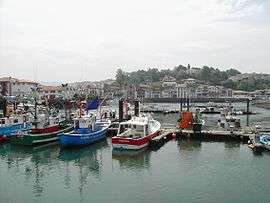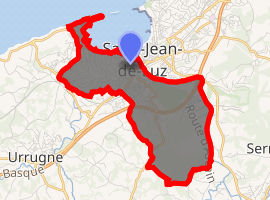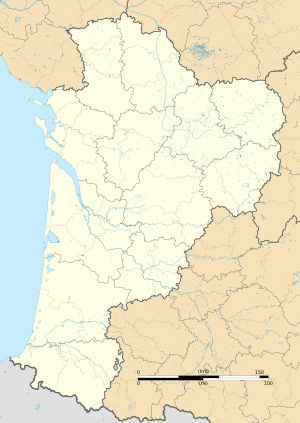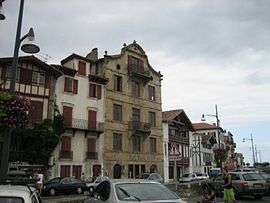Ciboure
Ciboure (Basque: Ziburu, meaning 'end of bridge') is a commune in the Pyrénées-Atlantiques department in south-western France.
Ciboure Ziburu | |
|---|---|
 Ciboure, seen from the harbour of Saint-Jean-de-Luz | |
.svg.png) Coat of arms | |
Location of Ciboure 
| |
 Ciboure  Ciboure | |
| Coordinates: 43°23′11″N 1°40′00″W | |
| Country | France |
| Region | Nouvelle-Aquitaine |
| Department | Pyrénées-Atlantiques |
| Arrondissement | Bayonne |
| Canton | Saint-Jean-de-Luz |
| Intercommunality | CA Pays Basque |
| Government | |
| • Mayor (2001–2008) | Guy Poulou |
| Area 1 | 7 km2 (3 sq mi) |
| Population (2017-01-01)[1] | 6,251 |
| • Density | 890/km2 (2,300/sq mi) |
| Time zone | UTC+01:00 (CET) |
| • Summer (DST) | UTC+02:00 (CEST) |
| INSEE/Postal code | 64189 /64500 |
| Elevation | 0–83 m (0–272 ft) (avg. 80 m or 260 ft) |
| 1 French Land Register data, which excludes lakes, ponds, glaciers > 1 km2 (0.386 sq mi or 247 acres) and river estuaries. | |
It lies across the river Nivelle from the harbour of Saint-Jean-de-Luz.
Ciboure is, like its neighbour, a pretty town with many buildings of the traditional Basque style of Lapurdi. The 16th-century church of St Vincent has an octagonal tower, Basque galleries and a Baroque altarpiece. Adjacent to Ciboure is the Fort of Socoa, a 15th-century fortress built by Louis XIII.
Notable people
Ciboure was the birthplace of:
Ciboure was the residential place of:
- American Time magazine journalists and authors Charles Wertenbaker and Lael Tucker Wertenbaker, their son Christian and daughter Timberlake Wertenbaker, who grew up in the Basque Country and were educated in France.[2]
- Florentino Goikoetxea, a Basque smuggler and, during World War II, a guide across the Pyrenees of Allied airmen shot down in occupied Europe and attempting to escape to neutral Spain. Florentino received the George Medal from Great Britain and the Legion of Honor from France.
gollark: PotatOS's one "does" 150"H"/s.
gollark: PotatOS has an "ingame" "krist miner".
gollark: Yes they have.
gollark: Remember, if you have useful PotatOS potatochanges please PR them back!
gollark: And annoys admins also hi.
References
- "Populations légales 2017". INSEE. Retrieved 6 January 2020.
- In 1955 Lael Tucker Wertenbaker and her son Christian were filmed and interviewed by Orson Welles on the Basque Country. Living in Ciboure, Basque, at that time, Lael gives a lively insight to that small town on the northern side of the Pyrenees and basque people and culture. Christian gives some short answers,see: "Around the World with Orson Welles" - Orson Welles on the Basque Country with Lael Tucker Wertenbaker. In 1955, Orson Welles became involved in a BBC series of film documentaries (in black & White), titled "Around the World with Orson Welles".
External links
| Wikimedia Commons has media related to Ciboure. |
- Mes Vacances à Ciboure - Socoa
- ZIBURU in the Bernardo Estornés Lasa - Auñamendi Encyclopedia (Euskomedia Fundazioa) Information available in Spanish

Birthplace of Maurice Ravel in Ciboure
This article is issued from Wikipedia. The text is licensed under Creative Commons - Attribution - Sharealike. Additional terms may apply for the media files.
